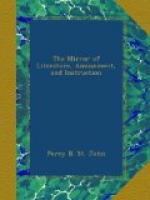The philosophical works of Sir Humphry Davy are written in a clear and perspicuous style, by which means he has contributed more to the diffusion of scientific knowledge than any other writer of his time. His three principal works, “Chemical and Philosophical Researches,” “Elements of Chemical Philosophy,” and “Elements of Agricultural Chemistry,” are in a popular and familiar style, and the two last are excellently adapted for elementary study. His numerous pamphlets and contributions to the Transactions of the Royal Society have the same rare merit of conveying experimental knowledge in the most attractive form, and thus reducing abstract theory to the practice and purposes of life and society. The results of his investigations and experiments were not therefore pent up in the laboratory or lecture-room where they were made, but by this valuable mode of communication, they have realized what ought to be the highest aim of science,—the improvement of the condition and comforts of every class of his fellow-creatures. Thus, beautiful theories were illustrated by inventions of immediate utility, as in the safety-lamp for mitigating the dangers to which miners are exposed in their labours, and the application of a newly-discovered principle in preserving the life of the adventurous mariner. Yet splendid as were Sir Humphry’s talents, and important as have been their application, he received the honours and homage of the scientific world with that becoming modesty which universally characterizes great genius.
Apart from the scientific value of Sir Humphry’s labours and researches, they are pervaded by a tone and temper, and an enthusiastic love of nature which are as admirably expressed as their influence is excellent. In proof of this feeling we could almost from memory, quote many passages from his works. Thus, speaking of the divine Study of Nature, he has the following reflective truths:—“If we look with wonder upon the great remains of human works, such as the columns of Palmyra, broken in the midst of the desert, the temples of Paestum, beautiful in the decay of twenty centuries, or the mutilated fragments of Greek sculpture in the Acropolis of Athens, or in our own Museum, as proofs of the genius of artists, and power and riches of nations now past away; with how much deeper feeling of admiration must we consider those grand monuments of Nature, which mark the revolutions of the globe; continents broken into islands; one land produced, another destroyed; the bottom of the ocean become a fertile soil; whole races of animals extinct; and the bones and exuviae of one class, covered with the remains of another, and upon the graves of past generations—the marble or rocky tomb, as it were, of a former animated world—new generations rising, and order and harmony established, and a system of life and beauty produced, as it were out of chaos and death; proving the infinite power, wisdom, and goodness, of the GREAT CAUSE OF ALL BEING!”




